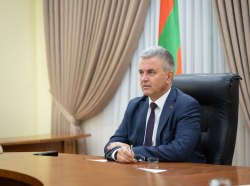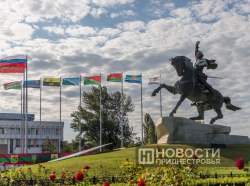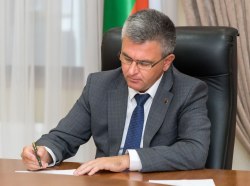Energocom (RM) has signed an agreement with Moldavskaya GRES on the supply of electricity for December this year. In addition, the possibility of extending the contract for the period from January to March 2023 is now being considered.
As it became known, deliveries will amount to 204 thousand MW in December. The price will be $73 per MWh.
Moldovagaz will supply 5.7 million m3 of gas per day to Pridnestrovie, including for MGRES to generate electricity.
Recall that since October 1, the Russian Gazprom has limited the supply of natural gas to Moldova and Pridnestrovie to 5.7 million cubic meters per day. This happened due to a violation of obligations on the part of Moldova: Moldovagaz JSC, which is a party to the Moldovan-Russian gas contract, at that time allowed violations of the payment schedule for the blue fuel received and did not audit Moldova's historical debt for gas within the required time frame. Pridnestrovie turned out to be a hostage of the situation.
The result of the reduction in Russian gas supplies was the shortage of blue fuel in both Moldova and Pridnestrovie. It appeared dramatically by the third decade of October. Pridnestrovie has already resorted to austerity measures since the beginning of October, and on October 21 introduced a state of emergency and postponed the start of the heating season for several days. Moldavskaya GRES was forced to reduce the supply of electricity for export to Moldova.
On November 1, a new round of the gas crisis began for the PMR. Moldovagaz JSC unilaterally limited the volume of blue fuel going to Pridnestrovie by 40%, from 3.9 to 2.3 million cubic meters per day. The Moldovan side was not confused by the fact that such a decision runs counter to the terms of the Moldovan-Russian contract, where the volumes of gas for the Republic of Moldova and the PMR are clearly fixed.
As a result, the signing of another contract for the supply of electricity from the Moldavskaya GRES to Moldova was actually disrupted. The Republic of Moldova started to buy electricity in Romania, and today it is about three times more expensive than the Pridnestrovian one. Because of this, electricity tariffs for residential consumers continue to rise in the neighboring country.
The volume of gas that was taken away by Moldova from Pridnestrovie in November reaches almost 50 million cubic meters in total. In Tiraspol, already in early November, they expressed the opinion that this gas, among other things, could be pumped by the authorities of the Republic of Moldova into Ukrainian gas storage facilities.
On November 22, Gazprom reported that it was also recording Russian gas settling in Ukraine. NJSC Naftogaz, in response, noted that part of the blue fuel intended for Moldova and Pridnestrovie actually remains in Ukraine through a virtual reverse, which is carried out by the Moldovan authorities.
There is a version that gas can also be resold to Ukraine at market prices (at the same time, the re-export of blue fuel is prohibited by the contract between JSC Moldovagaz and Gazprom).
Pridnestrovie addressed the leadership of Russia and PJSC Gazprom with letters in which it outlined the situation with the illegal selection of blue fuel. The delegation of the Supreme Council of the PMR, headed by speaker Alexander Korshunov, visited Moscow, where they held meetings in the State Duma, the Federation Council and the Government of the Russian Federation. On November 22, appeals regarding the current crisis situation were sent by the President of the PMR Vadim Krasnoselsky and Chairman of the Supreme Council of the PMR Alexander Korshunov to the UN and the OSCE.
Pridnestrovie needs at least 100 million cubic meters of natural gas per month for its own needs (this figure will increase further in December due to the fall in temperature). In November, the republic only received 69 million. This led to the fact that the work of large industrial enterprises was suspended, the autumn holidays at schools were extended for a week, an hourly schedule for supplying hot water was introduced, while the temperature of the coolant in residential buildings was reduced.








